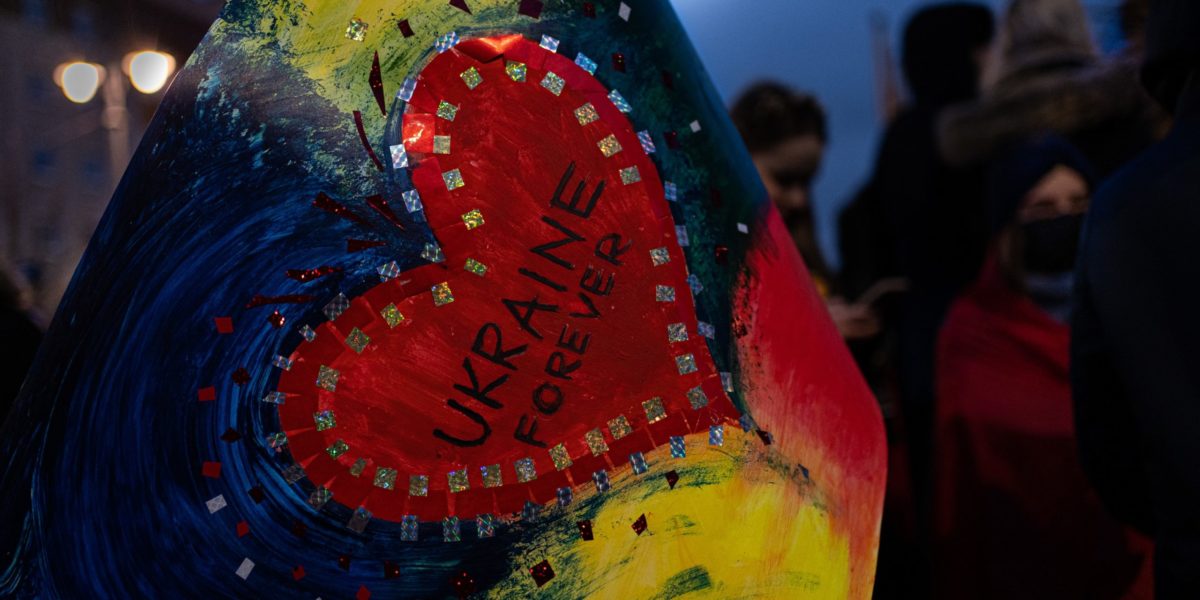As the war in Ukraine drags on, organizers of Kyiv Pride are focused on protecting fellow queer Ukrainians. Organizer Lenny Emson is hoping when the Kyiv Pride March does take place, that President Zelenskyy will attend and show his allyship to the queer community.
Emson, a Ukranian born LGBTQ human rights activist, identifies as a bigender individual and uses the pronouns s_he/him/his. Emson has spent 20 years fighting for the rights of queer Ukrainians, a fight that won’t end even in the face of war.
The organization is shifting focus from work on anti-hate crime legislation and pushing for the legalization of marriage for LGBTQ couples, to realigning their efforts to meet the rapidly changing needs of Ukrainians under the threat of violence.
“Many people lost their jobs in one day. Companies just closed down and left without saying a word to their employees,” Emson said. “Now we have lots of people left alone, no money, no food. Some have a mother or father or children to take care of. Some people have animals.”
Kyiv Pride has reorganized its funds to help make sure community members have access to gas, food, prescriptions, and supplies to relocate. Emson is also prioritizing psychological support for those who may not be able to understand what’s taking place or how to navigate the uncertainty that comes with war.
“People are scared,” s_he said. “There’s fear of losing everything.”
Fortunately, Emson has heard from psychologists around the world offering pro bono mental health services to displaced Ukrainians in support groups.
Last month, the Kharkiv Women Association Sphere NGO, a “lesbian-femenistic organization founded in 2006,” in a press release noted that while they can’t predict future events, they plan to support their communities and promote peace by holding “educational, informational, and public events dedicated to equality, diversity, and human rights.”
The NGO had been working on organizing Women’s Solidarity Weeks—which would “traditionally include the Women’s Solidarity March on March 8” before the invasion. Sphere remains hopeful that they can still hold two Pride Marches in September.
While homosexuality was legalized in Ukraine in December 1991, same-sex marriage continues to be against the law in the country, with Ukraine’s justice ministry noting in 2018 there were no current legal grounds to recognize same-sex marriage in the country.
“To date, no draft laws or government decisions regarding the legalization of same-sex partnerships in civilian or other forms have been developed,” Deputy Justice Minister Natalia Bernatska said at the time.
While same-sex marriage isn’t recognized, conversion “therapy” practices remain legal in Ukraine, representing a slow progress in the country on LGBTQ rights. In September 2021, roughly 7,000 people gathered in Kyiv for the annual March for Equality.
As the Associated Press noted in 2019, “LGBT rights groups say Ukrainian police often ignore homophobic or transphobic motives of the attacks, classifying them as hooliganism.”
A June 2021 study by the United Nations Refugee Agency noted that “nearly 70 United Nations Member States criminalize consensual same-sex sexual acts de jure or de facto. Six States impose the death penalty, and sources indicate that the death penalty may be prescribed in five additional states, though with less legal certainty.”
The study, LGBTIQ+ Persons in Forced Displacement and Statelessness: Protection and Solutions, found that upon arriving to their country of asylum, some LGBTIQ+ refugees “are forced into isolation to protect themselves.”
For Edward Reese, a non-binary trans Ukrainian and an organizer with Kyiv Pride, the war has already changed his life completely. Reese made the difficult decision to flee the city in the early days of Putin’s invasion.
Now safe in Denmark, he wakes up each morning to check his group chat with loved ones back in Ukraine. Every conversation seems to start the same way: Are you alive? Is everything okay? How is the cat?
With gas, groceries, and prescriptions available in such limited quantities, Reese realized the people who need resources most are both military members and Ukrainians who are too sick or elderly to escape. On March 8, Reese packed what he could fit in a small backpack, kissed his cat Mars goodbye (named after the God of War and the chocolate bar!) and left for his final destination of Copenhagen.
“When this is all over, I really think that there will be no place for xenophobia, racism, transphobia, homophobia in a country which survived a war,” he said.
Reese pointed out that the great majority of Ukrainians still refuse to recognize the rights of trans people. Due to that ambiguity, Reese explained that many trans people have been forced to identify as the same gender as their documentation to ensure they can properly flee the war and secure asylum in a safe place.
He also added that while the process isn’t fast, the Ukrainian government does offer services to change documents for trans people, something that could help legitimize their identity when seeking asylum.
“I really hope that in the future, after the war, Ukrainian trans people will be more caring about themselves,” Reese said, noting there will be a mass mental health crisis in the wake of the invasion.
“Anything can happen while you’re living next to Russia.”




